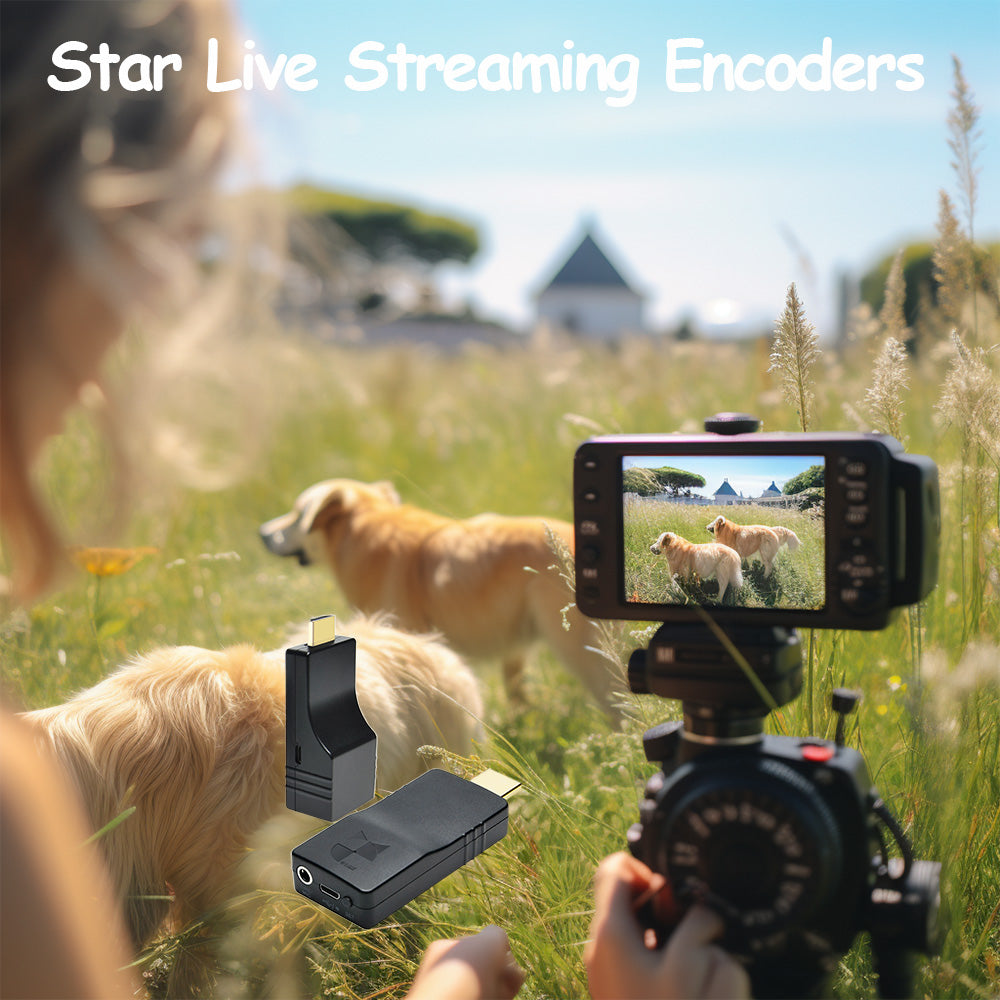
HDMI Encoders: How Do They Redefine the Game in Sports Competitions?
Share
In the adrenaline-fueled world of sports, where every moment is a heartbeat, a silent champion stands tall – the HDMI encoder.
With an increasing demand for enriched viewing experiences that transport fans closer to the live action, event organizers have come to rely on the reliable transmission of pristine quality video and audio enabled by 4k streaming encoders.
By efficiently handling numerous camera feeds captured from all around the venue simultaneously, HDMI encoders ensure an uninterrupted broadcast distribution to an array of display devices.
HDMI Encoder:a Silent Champion
Have you ever wanted to watch a movie on more than one TV at the same time? Or show the same presentation on different screens around a school? Or you can see every high-definition moment during a sports competition on a large screen, which is so clear that you can even see the pores of the athletes? An HDMI encoder can help with that.
Table of Contents:
- HDMI Encoder:a Silent Champion
- Definition of HDMI Encoders
- Overview of the Role of HDMI Encoders
-
Understanding HDMI Encoders
- Explanation of HDMI Technology
- Comparison with Other Video Transmission Technologies
- What Makes HDMI So Great
- Applications of HDMI Encoders in Sports Competitions
- Broadcasting Live Sports
- Streaming Online
- Why more and more options prefer DDMALL’ HEV-4KW Encoder?
- Case Studies: How HDMI Encoders Help Broadcast the FIFA World Cup
HDMI, or High-Definition Multimedia Interface, is a digital audio/video interface that enables the transmission of uncompressed digital data from a source device like a camera to a display device like a television or projector.
The encoder squishes down the video signal with something called "compression". That makes it small enough to zip around your network wires really quickly.
Then wherever you have an HDMI TV or projector hooked up, there's a decoder. The decoder unzips the video back to its normal size so it looks great on those screens.
As long as your TVs and the encoder are connected to the same network, you can broadcast one picture to tons of displays anywhere in the building. It's like a cable box but works over your existing school or home WiFi and cables. Pretty cool, right?
Overview of the Role of HDMI Encoders
As the maestros conducting the symphony of video transmission, HDMI encoders play a pivotal supporting role in any multi-screen setup.
Whether pumping up a crowded sports bar before the big game or illuminating an entire stadium during half-time, encoders transmit without interruption.
Live events thrive on energy transfers between participants - laughs, cheers and reactions bounce communicably through a crowd and at home. Encoders let technology do the same, spreading excitement contagiously from room to room.
Some key advantages of HDMI encoders especially HEV-4KW that features in AV over Internet technologies include:
True 4K Streaming: The HEV-4KW HDMI encoder delivers true 4K streaming capabilities, providing high-resolution video broadcasting specifically designed for sports competitions. With support for HEVC/H.265 and AVC/H.264 encoding, it ensures efficient compression while maintaining excellent video quality, allowing viewers to enjoy the finest details and immersive experience of live sports events.
Portability and Flexibility: The ultra-mini and ultra-lightweight form factor of the HEV-4KW makes it a portable broadcast encoder. Its wireless capabilities, combined with the built-in 5G+2.4G dual-wifi antenna, enable streaming from anywhere with Wi-Fi coverage, without the need for cable connections. This portability and flexibility make it ideal for on-the-go streaming applications.
Easy Setup and Power Options: Setting up the HEV-4KW encoder is simple and convenient. Just plug it into the HDMI port of a camera and power it using a mobile power bank or the USB port of a signal source. This feature is particularly useful for streaming applications that require mobility or extended working time.
Broad Protocol Support: The HEV-4KW encoder supports various streaming protocols, including SRT, HLS, RTMP, RTMPS, RTSP, RTP, UDP, and TCP. This wide protocol compatibility ensures seamless integration with different streaming platforms and enables simultaneous live streaming to multiple destinations, such as Facebook, YouTube, Twitch, Vimeo, Wowza, and more.
User-Friendly Interface and Control: The HEV-4KW encoder offers a user-friendly web interface for easy configuration and control. Users can access the web UI from any web-enabled device to configure settings, monitor video status, and make real-time on-screen display (OSD) adjustments. Additionally, the encoder's set button allows for immediate start or stop of streaming, providing convenience and control during live broadcasts.
Understanding HDMI Encoders
Explanation of HDMI Technology
HDMI (High-Definition Multimedia Interface) has revolutionized video transmission since its introduction in 2002. By utilizing compressed digital signals instead of analog, HDMI is able to reliably deliver pristine video and multi-channel audio over a single cable.
Through several successive generations, HDMI specifications have continuously evolved to support higher resolutions, frame rates, and bandwidth capabilities.
Let’s break down how HDMI works its magic.
Signals travel through HDMI cables from devices like cable boxes and Blu-ray players to your TV. These signals are made of tiny 1s and 0s called digits that tell the TV what pictures and sounds to display.
HDMI ensures these digits get sent quickly and reliably with no hiccups or lag so you never miss an important play. Over time, HDMI has gotten even better at handling super sharp, lifelike images and immersive sound. This means sports watching is more exciting than ever!
Comparison with Other Video Transmission Technologies
While HDMI surpasses other legacy interfaces, it also bests modern competitors in performance and features.
When compared to DisplayPort, HDMI offers broader device compatibility though DisplayPort can support higher refresh rates.
Alternative wireless standards like AirPlay lack the low latency and bandwidth of a wired HDMI connection. Even IP-based streaming technologies introduce higher encoding delays compared to HDMI.
For broadcasting fast-paced live sports, reliability portability and near instant video/audio synchronization are paramount.
Here, HDMI encoders, which encode and transmit HDMI video streams over long distances, have emerged as the tool of choice.
Their error-free transmission, low latency, and versatile connectivity options make HDMI encoders ideally suited for distributing pristine sporting events across multiple screens.
Composite connectors, which you might find on older TVs and VCRs, are simple but just can't keep up. They squeeze video down to tiny boxes that look pixelated. Audio and video also fall out of sync a lot.
HDMI simply delivers the crispest, most detailed pictures without misses. Its advantage is as obvious as the ref’s calls on game day.
What Makes HDMI So Great
HDMI has a few major talents that sports broadcasters love. Here are the top features in basic terms:
Portability and Ease of Use: HDMI encoder provides plug-and-play connectivity without complicated setup steps, allowing systems to be easily transported and configured on location.
Sound/Video Sync: HDMI synchronizes up the audio and visuals perfectly. This way cheers from the crowd match the action on screen with perfect sync. No more annoying lag!
High Resolutions: HDMI handles super sharp 4K and up to 60 frames per second for ultra-smooth motion. That means you can see every detail of the sports competition in stunning quality.
Low Latency: HDMI minimizes lag and delays. This ensures everything you see happened live—no more being spoiled by someone telling you about a goal seconds before you see it!
Compatibility: HDMI is super flexible. Whether you use a bunch of devices or just a game console, HDMI adapts to make it all work together seamlessly.
Applications of HDMI Encoders in Sports Competitions
Broadcasting Live Sports
Compact and Portable Design: Measuring merely 75x32x15mm and weighing only 25g, the ultra-mini and ultra-compact HEV-4KW can be easily installed into busy broadcasting equipment, even fast-moving cameras can be easily carried and used. Its ultra-portable form factor allows smooth camera mounting and maneuvering for capturing action shots on the go.
Wireless Streaming Capability: Leveraging built-in WiFi functionality, the HEV-4KW eliminates tangled cables by enabling wireless video transmission up to 30m. This provides broadcasters optimum flexibility to freely move around the field/court and switch between different camera angles in real-time.
Multi-Platform Streaming: Sports fans can stream on 4 platforms imultaneously like Youtube, Facebook, Twitch and more using just a single HEV-4KW encoder. Its multi-streaming capability maximizes viewership by reaching diverse online audiences all at once on their preferred platforms.
Smooth Pictures and Sound: HEV-4KW HDMI encoder supports 4K@60p video output and ensures flawless video and audio transmission during live sports broadcasting. Viewers can enjoy lag-free, stutter-free live sports experience.
Working seamlessly with Broadcast Gear: HEV-4KW HDMI hevc encoder is compatible with commonly used broadcast equipment such as cameras, replay machines, recording systems, etc. It integrates smoothly into the existing broadcast workflow to facilitate efficient live production.
Streaming Online
Watching from Afar: HEV-4KW HDMI encoder supports H.265 and H.264 compression to enable high quality online streaming of sports events. This allows fans around the world to follow their favorite teams via live streaming when unable to attend the game site.
Interactive Engaging Viewing: Experience the thrill of interactive and engaging viewing with the HEV-4KW HDMI encoder. This advanced technology cooperates with camera takes streamed sports presentations to the next level by offering additional features such as multi-camera options, real-time , and instant replays. With these enhancements, remote audiences can enjoy an elevated level of interactivity and engagement while watching their favorite sports events.
Choose Your Perspective: In addition to the main camera view, HEV-4KW HDMI encoder allows setting up of 4 independent channels HDMI encoder for broadcasters to switch between different angles, providing viewers with more perspectives to choose from during live streaming.
Why more and more options prefer DDMALL’ HEV-4KW Encoder?
HEV-4KW HDMI encoder is designed with portability and ease of use in mind, making it a plug-and-play solution for connecting your devices without any complicated steps. With its compact size and user-friendly interface, you can effortlessly set up and connect your devices, saving you time and frustration.
The encoder allows you to quickly establish a connection between different ends without the need for extensive technical knowledge or complex configurations. Simply plug in your HDMI-enabled devices, and the encoder will automatically detect and synchronize the audio and video signals, ensuring a seamless and hassle-free experience.
Whether you're a sports broadcaster on the go or setting up a live event, our HDMI encoder's portability and ease of use make it a convenient choice. You can easily transport it to different locations, connecting it to various display devices without any hassle. Say goodbye to the inconvenience of carrying bulky equipment or dealing with complicated setup procedures.
With our HDMI encoder, you can enjoy the benefits of sound/video sync, high resolutions, and low latency that HDMI offers, while also experiencing the added advantage of its portability and ease of use. It's the perfect solution for sports broadcasters and anyone seeking a simple yet powerful HDMI connection solution.
Case Studies: How HDMI Encoders Help Broadcast the FIFA World Cup
The FIFA World Cup is one of the biggest sporting events in the world. Held every four years, it brings together the best national soccer teams from around the globe.
Dozens of cameras are positioned around the stadium to show the game from every angle. Recording and transmission equipment is set up both inside and outside the venues.
This is where HDMI h.265 hardware encoders enter the picture. Their mission is to take high definition video feeds from the 100+ cameras deployed and format them suitably for transmission.
But performing this transfer encoding at the scale required for a World Cup is no mere technical role - it's a feat of engineering in its own right.
This is the monumental challenge taken on by encoders at FIFA World Cup sites. Within bustling broadcast compounds, multiple encoders must efficiently encode over a dozen full HD camera streams simultaneously while introducing negligible latency.
It's a dizzying technical waltz masterfully choreographed through armies of encoders. At the 2018 Russia World Cup for instance, the IBC had over 100 monitoring screens signaling encoder status across 12 venue sites.
Any glitch in the encoding could cause delays or pixilation for hundreds of millions watching a given match.
The encoding solutions powering today's World Cup have thus evolved tremendously from the early digital days.
Through it all, viewers are none the wiser to encoding's key enabling role. For soccer fanatics watching their country's stars battle on Europe's grandest stages, the experience feels as effortless as the players gliding across verdant pitches.
But behind that effortlessness lies a high-performance HDMI encoder ensemble of invisible thing working tirelessly to share world football's magic with all.
Conclusion
Whether for massive international tournaments or local grassroots games, encoding ensures the thrill of competition transcends borders - it becomes an inclusive global spectacle connecting communities through their shared fandom.
Without HDMI encoders behind the scenes, orchestrating the smooth flow of video and audio, the drama, elation and energy of sports simply could not be broadcast at its full intensity. They are the lynchpin making the moving mosaic of sports broadcasting cohesively pop off screens.

